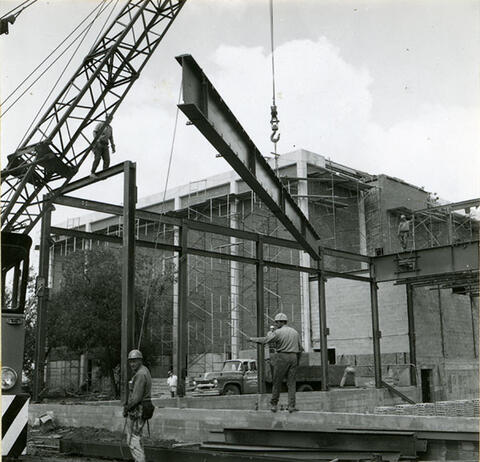
Área de título y declaración de responsabilidad
Título apropiado
Physical Education Building - Addition - Construction
Tipo general de material
- Graphic material
Título paralelo
Otra información de título
Título declaración de responsabilidad
Título notas
Nivel de descripción
Item
Institución archivística
Código de referencia
Área de edición
Declaración de edición
Declaración de responsabilidad de edición
Área de detalles específicos de la clase de material
Mención de la escala (cartográfica)
Mención de proyección (cartográfica)
Mención de coordenadas (cartográfica)
Mención de la escala (arquitectónica)
Jurisdicción de emisión y denominación (filatélico)
Área de fechas de creación
Fecha(s)
-
Sept. 1963 (Criação)
Área de descripción física
Descripción física
1 photograph : b&w ; 5.6 x 5.6 cm
1 negative : b&w ; 10 x 12 cm
Área de series editoriales
Título apropiado de las series del editor
Títulos paralelos de serie editorial
Otra información de título de las series editoriales
Declaración de responsabilidad relativa a las series editoriales
Numeración dentro de la serie editorial
Nota en las series editoriales
Área de descripción del archivo
Nombre del productor
Historial de custodia
Alcance y contenido
Progress shot of construction; two workers walking on steel beams. Crane [dropping a steel beam in place].
Bio/Historical Note: Initially two directors conducted an athletic and physical education program for female and male students and staff. Classes were designed to prepare some students as physical education instructors for elementary and secondary schools. As early as 1940 all freshmen students were required to enroll in a one-year physical activities class. The Physical Education Building was constructed from 1948-1949 as part of the $2.5 million Varsity Expansion Program. Built at a cost of $235,000, the centre was designed by F.J. Martin and built by Shannon Brothers Construction. The frame of the building was constructed from a double RCAF hangar erected at Dafoe, probably in 1940, and subsequently moved to Saskatoon in 1948. In 1950 a Department of Physical Education was established to carry on a service program for all students and to provide for physical education classes as electives in the Colleges of Arts and Science and Education. The Physical Education Building was officially opened on 10 February 1950 for the annual basketball game against the University of Alberta, which the Huskies lost 27-36. The completion of the building meant that the University of Saskatchewan finally possessed a real physical education and athletics centre after decades of makeshift facilities. The Main Gym floor consisted of three basketball courts and six badminton courts. The main basketball floor was the only regulation-size basketball floor in Saskatchewan at the time. The building also contained dressing rooms, lockers, showers, drying rooms, boxing and wrestling rooms, and space for offices. The Department became a School within Arts and Science in 1958, offering a 4-year course leading to the Bachelor of Arts in Physical Education. In 1959 a dance studio was added to the building. The graduate program and scientific research expanded in the 1960s. In April of 1960 Black, Larson, McMillan and Associates performed an architectural and structural appraisal of the building in preparation for expansion plans on the building. They advised that with proper maintenance the current building could be structurally sound for another 20 to 40 years. However, they warned that major renovations towards the end of this period would likely be required. Their recommendation at that time was that an entirely new complex be constructed at a cost of $2,180,000. The advantages of such a proposal were said to be obvious, as “the building would be planned from construction in stages, to meet ultimate requirements. Proper segregation and flow would be incorporated into the building. Outside activities could be located conveniently to the building.” In short, the building could be built and designed to accommodate for the changing needs of the department over time. However, these recommendations were ignored in favour of extending the existing building, which was less expensive. A pool addition was built by Shoquist Construction from 1963-1964 for $898,254. The Pool addition was designed by Black, Larson and McMillan. During the 1969-70 academic year major renovations and alterations were made to the building. In 1972 the School achieved College status. In 1998 the College was renamed the College of Kinesiology. An office addition was completed in 1988 by Dunmac General Contractors for $136,952, and was designed by Bergerman Solodre. On 7 December 1997 the University, acting on consulting Engineer's reports, determined that the Physical Education Centre was no longer structurally sound. Offices were moved from the building within hours and relocated to the Williams Building on Cumberland Avenue, and the building was partially demolished in 1998. Completed demolition occurred by 2000. The Physical Activity Complex (PAC) was officially opened on 28 Nov. 2003 for the College of Kinesiology, community activity programs, and Huskie Athletics. Griffiths Stadium (offering playing field with artificial turf, running track and grandstand seating) was upgraded in 2006 for the Huskie football Vanier Cup playoffs. Merlis Belsher Place, a multi-use ice facility, opened in 2018, replacing the nearly 90-year-old Rutherford Rink.
Área de notas
Condiciones físicas
Origen del ingreso
Arreglo
Idioma del material
Escritura del material
Ubicación de los originales
Disponibilidad de otros formatos
Restricciones de acceso
Condiciones de uso, reproducción, y publicación
Photographer: Unknown
Copyright holder: Unknown
Other terms: Responsibility regarding questions of copyright that may arise in the use of any images is assumed by the researcher.
Instrumentos de descripción
Materiales asociados
Acumulaciones
Location note
vol.30

